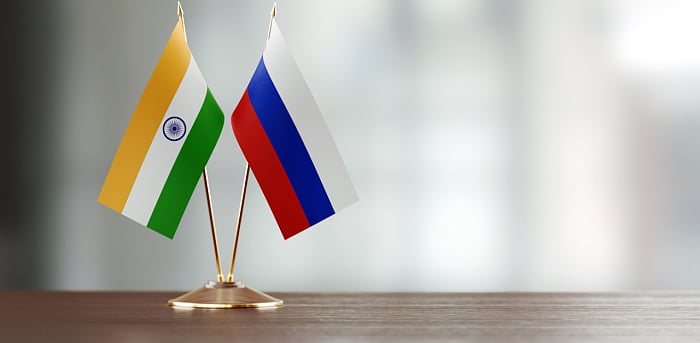
Amid escalating tensions between Russia and the US over the Ukraine crisis, India finds itself in a diplomatic fix. It's been forced to tread an extremely thin line so as to maintain a fine balance in its close relations with both Moscow and Washington as the two spar over Ukraine.
Matters took a more serious turn on Monday after a defiant Russian President Vladimir Putin ordered the deployment of troops in two rebel-backed separatist regions in the eastern part of Ukraine – they describe themselves as the Donetsk and Luhansk People's Republics. He also officially recognised these two regions as being independent.
In recent weeks, Russia has amassed thousands of troops near Ukraine's borders amid gathering war clouds as the West, led by the US, counters Moscow's aggressive moves. The moves have been seen not just as a threat to Ukrainian sovereignty but also regional stability and the larger global order amid fears that the conflict could spiral into war.
President Putin's action is driven by the possibility of Ukraine joining NATO. He is seeking a guarantee this will never happen, fearing it will bring the military alliance to his nation's doorsteps. But his aggression in many ways is also driven by the desire to reclaim Ukraine. He indicated as much when he said on Monday that "Ukraine was ancient Russian land".
The recognition of the separatist regions by Russia appeared to make an actual conflict more imminent. Undoubtedly, India is keeping its fingers crossed, hoping matters do not come to such a pass as this would further queer the pitch for New Delhi. Thus far, it has adopted a cautious and carefully calibrated reaction to Russian belligerence, advocating de-escalation in keeping with India's own strategic interests.
While India has traditionally had close ties with Russia (erstwhile USSR), it has been increasingly leaning towards the US over the last two decades. The growing New Delhi-Washington clinch, driven in recent years by common enemy China, has also seen India-US strategic interests converge in the form of the Quad and the increasing focus on the Indo-Pacific.
Yet, at the Quad meeting of foreign ministers in Melbourne earlier this month, there was no mention of the Ukraine crisis in the joint statement. There was a further indication of New Delhi's unwillingness to slam Moscow when External Affairs Minister S Jaishankar chose to sidestep a question on whether Ukraine figured in the discussions saying the meeting's focus was on the Indo-Pacific.
While the Indo-US embrace has caused much discomfiture in Moscow, New Delhi has been careful to assure the old friend that their relations remain important and their 'Special and Privileged Strategic Partnership' intact.
Also Read — India should stand with the West against Russia
Russia continues to be a major and reliable supplier of defence equipment to India despite other countries too finding a significant foothold in India's defence market. India has also bought the S-400 surface-to-air missile systems from Russia despite the threat of US sanctions.
That Russia remains vital to Indian strategic interests is evident in New Delhi's approach to the Ukraine crisis. While many countries have condemned the Russian move and see it as a violation of Ukraine's sovereignty, India has eschewed such strong remarks. Indeed, at the beginning of February, India threw in its lot with the Russians when it chose to abstain from a vote at the UN Security Council on having an open meeting on Ukraine.
At an emergency meeting of the UN Security Council on Monday (February 21), India chose to adopt a cautious stance. India's Permanent Representative to the UN Ambassador T S Tirumurti spoke about the need for "de-escalation" and "restraint" while expressing "deep concern" over the "escalation of tension" along the Ukraine-Russia border.
The de-escalation, India said, needed to take into account "the legitimate security interests of all countries and aimed towards securing long term peace and stability in the region and beyond." In referring to the legitimate security interest of other countries, India appeared to back Moscow's security concerns about NATO near its borders if Ukraine were to join it.
However, matters will decidedly get more complicated for New Delhi if Russian forces were to invade Ukraine. Then, cautious statements such as "de-escalation" may no longer be an option for Delhi unless it decides that discretion is the better part of valour.
New Delhi's close ties with Moscow isn't the only deciding factor in its reluctance to go beyond the usual demand for "de-escalation". India also needs to keep in mind the deepening Russia-China ties, especially at a time when its own relations with China have hit rock-bottom amidst a continuing troop face-off in eastern Ladakh that erupted in May 2020.
India would also be worried that if the Ukraine crisis were to culminate in a full-fledged conflict, it would divert US attention from China and the Indo-Pacific and consequently less focus on the India-China military confrontation that seems nowhere near resolution as of now.
Russian overtures to Pakistan, too, are another reason why New Delhi would not want to burn its bridges with Moscow. While Russia has always backed India on Kashmir, stating it is a bilateral issue, the growing Moscow-Islamabad friendship requires New Delhi to keep a close eye on developments. Pakistan PM Imran Khan will be in Moscow for two days beginning February 23. It's the first visit to Russia by a Pakistan PM in over two decades.
While both Russia and the US may as yet be unwilling to smoke the peace pipe, for India, it remains the only viable way forward given its own strategic compulsions. It's an uncomfortable wait-and-watch situation for India.
(The writer is a senior New Delhi-based journalist)
Disclaimer: The views expressed above are the author's own. They do not necessarily reflect the views of DH.
Watch the latest DH Videos here: